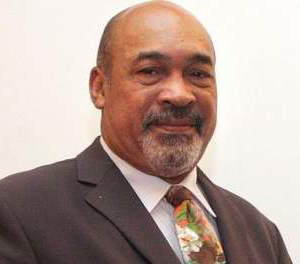In an impassioned plea against the 20 years the prosecutor is seeking for his client, Surinamese President Desi Bouterse, attorney Irvin Kanhai on Monday told a Surinamese court the men his client is accused of killing some 35 years ago were involved in ‘high treason’ in a grand collusion with the Netherlands but denied Bouterse had anything to do with their deaths even though he was the then military leader.
Kanhai, according to the Dagblad Suriname newspaper, also argued that many of the witnesses in the case against his client were not present at the time of the killings,
Last year, prosecutor, Roy Elgin had asked the court for Bouterse to be sentenced to 20 years in prison for his role in the December 1982 killing of 15 prominent political opponents in Suriname. In summation of the evidence of the years-long trial, the prosecutor had said that that there is sufficient proof that Bouterse was present when troops under his command executed opponents of his then-military dictatorship.
Those killed included union leaders, activists and journalists and they were killed in a colonial fort in the capital city of Paramaribo in an incident now referred to as the “December killings”.
The lawyer took issue with the incident being referred to as the ‘December killings’ or December murders’. He said this is the name given the trial by Dutch media for the past 35 years to ‘poison’ and ‘brainwash’ the Surinamese despite the fact that the official name for the legal procedure is the December 8th trial.
“That does not detract from the fact that the death of the compatriots who were under arrest in Fort Zeelandia, after 35 years is still a deep traumatic experience, which we will probably only be able to overcome with patience and true love for each other. Yet we cannot escape the image of how much greater this tragedy would have been if the invasion had continued,” the newspaper reported the lawyer as saying.
According to the newspaper Kanhai launched a wide-ranging attach on the country’s former motherland in his 95-page submission as he asked the court to acquit his client in full and to declare the prosecution’s case inadmissible based on the Amnesty Law.
Bouterse had pushed through the Amnesty Law shortly after he was elected but it was ruled unconstitutional. In 2016 he had directed the country’s attorney general to immediately halt the legal proceedings against him in the interests of national security but the court had ruled he could not do so since proceedings had already started.
The lawyer pointed to the testimony of witness Petrus van Haperen, the Dutchman who had indicated that he had been intensively involved in the preparation of the intended invasion by the Netherlands of Suriname which was planned for the night of 24 to 25 December 1982, when most people would have been on the inside preparing for Christmas.
He also took issue with the fact that the foundation of the case is based on witnesses after so many years and whose memories could have been compromised over the years by various events and mediums such as television, radios and newspaper or even by talking to friends.
According to Kanhai, the Netherlands has tried, from November 25th 1975, to reduce the independence of Suriname to a façade
Bouterse was convicted by a court in the Netherlands in absentia of drug trafficking in 1999 but cannot be extradited under Surinamese law. He has also travelled freely abroad.

